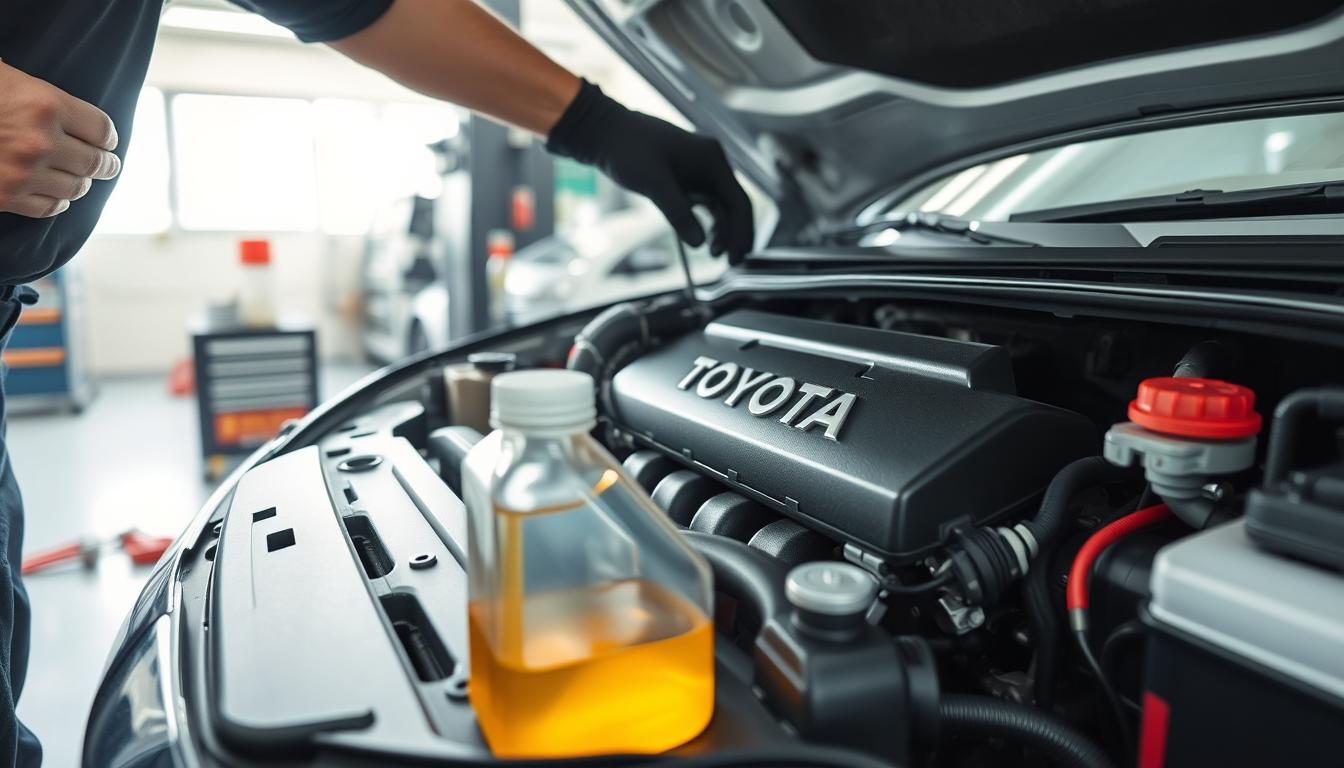Physical Address
304 North Cardinal St.
Dorchester Center, MA 02124
Physical Address
304 North Cardinal St.
Dorchester Center, MA 02124

Regular oil changes are key to keeping your Toyota’s engine in top shape. Oil acts as the engine’s lifeblood, lubricating parts and preventing overheating. It deteriorates over time, gradually losing its effectiveness. This guide will show you why toyota oil change is vital, how often to do it, and when your Toyota needs an engine oil change.
Older cars needed oil changes every 3,000 miles or three months. But, newer cars with advanced engines and synthetic oils can go 5,000 to 7,500 miles without a change. Even up to 15,000 miles is possible. Your driving habits, such as taking short trips or towing, can also influence how frequently you need an oil change.
Your Toyota’s engine is like its heart, and engine oil is its lifeblood. This vital fluid is key for your car’s engine maintenance and top performance. It lubricates moving parts, reducing friction and wear, and prevents overheating.
The oil function does more than just lubricate. It catches dirt, debris, and metal fragments that could harm the engine. Neglecting regular Toyota servicing and oil changes can result in the accumulation of contaminants, which can cause increased engine wear and lead to costly repairs.
Engine oil is vital for your Toyota’s engine to run smoothly and efficiently. It reduces friction between parts, making the engine run better and saving fuel. Clean oil also helps keep the engine cool by spreading heat.
Not changing your Toyota’s oil on time can cause big problems. As oil gets old, it can’t lubricate the engine well. This can lead to more wear, less engine performance, and lower fuel efficiency. It can also mean expensive repairs later on.
Regular oil changes are crucial for your Toyota’s engine health and longevity. By doing this, you keep your car running smoothly, improve its performance, and protect your investment.
Keeping your Toyota’s engine healthy is key, and changing the engine oil is a big part of that. The old rule was every 3,000 miles or three months. But, newer Toyotas can often go longer without needing an oil change.
Toyota suggests changing oil every 7,500 to 10,000 miles for cars using synthetic oil. This is true for models like the Camry, Corolla, RAV4, Prius, and Prius Prime. But, older Toyotas might need oil changes every 5,000 miles.
Regular oil changes are vital for your Toyota’s engine health and performance. By following the manufacturer’s guidelines and considering your driving habits, you can ensure your car runs smoothly.
Choosing the right motor oil is key to keeping your Toyota running well. Toyota cars can take different types of oil, like synthetic, semi-synthetic, and conventional. Knowing the differences helps you pick the best oil for your driving habits.
Conventional oil comes from nature and needs to be changed more often, every 3,000 to 5,000 miles. Synthetic oil, made in labs, lasts longer, needing a change every 6,000 to 10,000 miles. Synthetic oil costs more but offers better engine protection, better fuel use, and works well in extreme temperatures.
Toyota suggests using the oil type and viscosity grade listed in your owner’s manual for best engine performance. Common viscosities for Toyotas include 0W-20, 5W-30, and 10W-30. The right viscosity is key for good lubrication and engine health.
For the best oil choice, talk to a trusted Toyota dealer or mechanic. They can advise on the best motor oil type and viscosity for your car and driving style. Using the recommended synthetic oil or conventional oil helps keep your Toyota’s engine running smoothly and lasts longer.
Selecting the appropriate oil for your Toyota is crucial for ensuring top engine performance and longevity. Rely on the specialists at your local Toyota dealership to help you choose the ideal oil for your vehicle.
Keeping your Toyota’s engine healthy is key for its long life and best performance. One important part of engine care is regular oil changes. How can you tell when it’s time for an oil change? Here are some indicators to watch for:
Your Toyota has a light on the dashboard for oil changes. It turns on when it’s time to change the oil. This indicator is a helpful reminder to ensure your car receives the necessary care and maintenance.
Strange noises from your Toyota’s engine, like knocking or grinding, mean the oil is not doing its job. These sounds tell you the oil needs to be changed.
Other signs your Toyota needs an oil change include:
Checking your Toyota’s oil level and color regularly helps you know when to change it. By paying attention to these signs, you can keep your Toyota’s engine running well for a long time.
Failing to perform regular oil changes can result in expensive engine damage, so it’s crucial to attend to these warning signs without delay.
Changing your Toyota’s oil at home is easy and can save you money. You just need the right tools and to follow the steps carefully. Learning to change your oil yourself can also help your Toyota last longer.
Doing a diy oil change on your Toyota can save you money. But, always check your owner’s manual or ask a professional if you’re not sure. Proper toyota maintenance is key to your vehicle’s health.
Consistent oil changes are crucial for ensuring your Toyota operates smoothly and efficiently. Clean engine oil lubricates parts and helps cool the engine. This boosts your toyota maintenance and engine efficiency.
Oil changes help your engine run smoothly. They reduce wear and improve how your car drives. A well-kept engine means better speed and performance.
Dirty oil makes your engine work harder, using more fuel. Changing oil on time saves fuel and money. It also eases engine strain, boosting engine efficiency.
| Oil Type | Fuel Efficiency Improvement |
|---|---|
| Genuine Toyota 0W-20 Motor Oil | Up to 0.6 miles per gallon |
| Aftermarket Synthetic Oil | Less than Genuine Toyota 0W-20 |
Choosing the right oil is important for your Toyota. Toyota suggests specific oils like Genuine Toyota Motor Oil or Mobil 1. They protect your engine and improve performance.

“Changing to Toyota’s 0W-20 motor oil can improve gas mileage by up to 0.6 miles per gallon compared to conventional and synthetic motor oils.”
Regular toyota maintenance keeps your car’s value high. It shows you care about your vehicle. With proper care, your Toyota will last longer and perform better, making your investment worth it.
The need for oil changes in your Toyota depends on how you drive. Some owners change their oil every 20,000 miles without problems. Yet, others need to do it every 5,000 miles to keep their car running well.
City driving is tough on your engine oil. Frequent stops and starts make the oil break down faster. But, driving on the highway lets the oil last longer because it’s not strained as much.
Extreme weather can also harm your engine oil. Driving in hot or cold, dusty, or humid places, or towing heavy loads, speeds up oil wear. Toyota suggests a severe-duty maintenance plan for these conditions. This plan means more frequent oil changes to protect your engine.
To keep your Toyota in top shape, check your owner’s manual. Watch the oil’s color and how well your car uses fuel. This helps you find the right time for an oil change based on your driving habits.
Adhering to the manufacturer’s specific recommendations in the owner’s manual for oil change intervals is vital for preserving your vehicle’s health and ensuring optimal performance.
Regular oil changes are key to keeping your Toyota in top shape. Toyota dealerships have the expertise and genuine parts to care for your car. But, the cost of these services might worry some owners. Let’s look at the benefits of dealership oil changes and how they stack up against independent mechanics.
Toyota dealerships have trained techs who know your car inside out. They use only Toyota-approved motor oils and filters for the best engine care. An oil change here also includes a full vehicle check, catching any problems early.
Independent mechanics might charge less for toyota dealership service, but they lack Toyota’s expertise. They might use parts that don’t meet Toyota’s quality standards. Also, getting your Toyota serviced at a dealership is safer for your warranty, so think about the long-term benefits.
| Toyota Dealership Oil Change | Independent Mechanic Oil Change |
|---|---|
|
|
When deciding between a Toyota dealership and an independent mechanic, think about convenience, cost, and your car’s long-term health. Choosing a dealership ensures your Toyota gets the specialized care it needs, keeping it running well for years.
When it comes to keeping your Toyota in top shape, you have two main choices: DIY oil changes or professional services. Each option comes with its own set of advantages and disadvantages to consider.
One big plus of DIY oil changes is saving money. Our research shows you can change your Toyota’s oil at home for about $38 to $45. This is cheaper than the $50 it costs at a professional service. Over time, this can really add up, especially if you change your oil often.
However, DIY oil changes can be time-consuming and demand the proper tools and expertise. You’ll need to buy an oil drain pan, jack stands, and the right tools to do it safely. Also, getting rid of the old oil can be a bit of a challenge.
If you’re not sure about how to change your oil, don’t have the right tools, or if your Toyota is still under warranty, it’s best to go to a professional. Some Toyotas have special oil change needs that only experts can handle. Dealerships and trusted mechanics can make sure your car is serviced right, using the correct oil and filter for your model.
So, whether to DIY or get a professional oil change depends on your comfort level, what you have available, and your Toyota’s specific needs. By considering the pros and cons, you can choose what’s best for you and your budget.

“Regular oil changes are crucial for preserving the performance and lifespan of your Toyota’s engine. Whether you choose to do it yourself or have a professional handle it, the key is to follow the manufacturer’s recommendations and use the right oil and filter for your vehicle.”
As a responsible Toyota owner, it’s key to think about how your car’s upkeep affects the planet. Proper oil disposal is vital for our environment. Don’t throw used oil in the trash or down drains, as it harms soil and water. Recycling your used oil is the green way to go.
Many places like auto parts stores and recycling centers take used oil for safe disposal. By doing this, you help lessen your car’s environmental impact. Also, look into eco-friendly oils like re-refined or biodegradable synthetic oils. They protect your engine well and are better for the planet.
By picking eco-friendly oils and recycling used oil, you help the planet. Remember, every small action counts in protecting our world.
The cost of a Toyota oil change can vary a lot. It depends on the oil type and where you get the service. Knowing these factors helps you plan and make smart choices for your Toyota.
Dealerships typically charge higher prices for oil changes compared to independent shops. Dealerships can cost between $50 to $100 or more. Independent shops might charge $30 to $60. Dealerships use genuine Toyota parts and have trained technicians, which adds to the cost.
ToyotaCare is a maintenance plan that offers free oil changes for two years or 25,000 miles. It can help lower the cost of keeping your Toyota in good shape.
| Service | Dealership Cost | Independent Shop Cost |
|---|---|---|
| Conventional Oil Change | $50 – $80 | $30 – $50 |
| Synthetic Oil Change | $60 – $100+ | $40 – $70 |
| Tire Rotation | $20 – $40 | $15 – $30 |
| Brake Inspection | $30 – $60 | $25 – $50 |
“Regular oil changes are crucial for preserving the performance and lifespan of your Toyota’s engine. By understanding the costs involved, you can make informed decisions about your vehicle’s maintenance and budget accordingly.”
Regular oil changes are just one part of keeping your Toyota in top shape. It’s also important to do tire rotations, brake checks, and fluid tests. Check your Toyota’s owner’s manual for the best times to do these tasks.
Keeping up with your Toyota’s oil change schedule is key. But don’t forget to do other important maintenance too. Rotate your tires every 5,000 to 7,500 miles to ensure even wear.
Also, change your air filter every 15,000 miles or once a year. Don’t forget seasonal maintenance like checking tire pressure and using winter-grade oil in cold months.
There’s more to keeping your Toyota running well than just oil changes. Regular washing and waxing keep it looking good and protect the paint. Also, watch out for warning lights and strange noises.
Fixing small problems early can prevent bigger issues. With a good maintenance plan, your Toyota will last longer and run better for years.